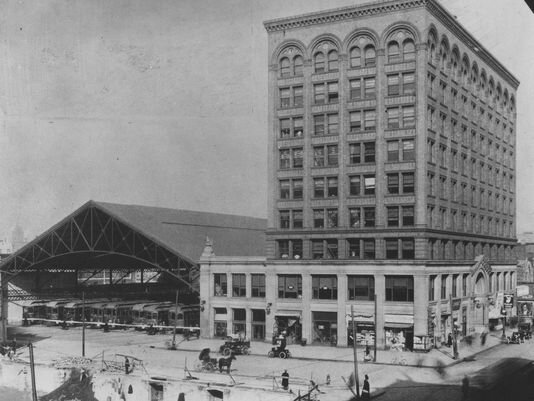Doctor Howard Blackburn is shown posing with Indiana Railroad high-speed interurban car No. 65 as it headed off to its second career in Davenport, Iowa. Eventually, this car made its way back to the Midwest as a crown jewel of the Illinois Railway Museum west of Chicago.
Contributed by Hoosier Heartland Trolley Co. Founding Board Member, Jake Stage
Support our nonprofit organization with a Company Store purchase or donation!
The Indiana electric railway story, a now distant memory for even our grandparents, is one the most fascinating, yet untold Hoosier stories.
Indiana, like many states in the young nation, had no dependable roadways to withstand the harsh weather fluctuations across the seasons. Thus, for Indiana, the interurban was the fastest and most dependable method of transportation for students, workers, the general traveler, and one’s perishable goods.
Indiana, a medium-sized Midwestern state, had one of the most complete electric railway networks in not only the United States, but the world. Second in route miles only to Ohio, which has considerably more square mileage, the electric railway network in Indiana was crucial to the early development of the Hoosier state.
The Indianapolis Traction Terminal was the largest and busiest electric railway terminal in the world.
With the interurban system dissolving in 1941 and streetcar systems converting to buses in the 1950s, many alive today do not remember nor even know the state had one of the world’s greatest transportation networks. In the 1920s, the electric railway system peaked with more than 15,000 operating trolleys and more than 2 million passengers in a year. Cars would depart the traction terminal in Indianapolis (trolley station) nearly every minute for destinations across the state, once passing the steps of the Indiana Statehouse.
Such a legacy deeply intertwined in our Hoosier fabric deserved to be preserved for future generations. Therefore, with the conclusion of the Golden Age of railroading in America, began the railway preservation movement.
Therefore, with the conclusion of the Golden Age of railroading in America, began the railway preservation movement.
Doctor Howard Blackburn, a young railfan and eventual medical doctor, was one of the originators of the railway preservation movement. It is because of Blackburn that we have live, color film footage of the interurban system in its last few years of its existence as well as the steam railways.
Thanks to the early efforts of people like Doc Blackburn, the HHTC team is restoring 100-year-old Indiana Union Traction Co. interurban No. 429 to operation. Seen here, the smoking section of No. 429 is resembling its original splendor for the first time in 80 years. December 2020
"Doc", as so many knew him, had a passion for the electric railways of Indiana that didn't stop with preservation of electric railway scenes on film. Doc was instrumental in founding several museums throughout the Midwest that have preserved the interurban story, ranging from Illinois to Indiana as well as Kentucky. His efforts also led to the preservation of the equipment that now makes up the Hoosier Heartland Trolley Company.
Most importantly, these contributions allow us to tell the important and forgotten stories of the electric railway industry and its remarkable people.
When acquiring the trolleys that comprise the HHTC collection, the significance of the project was not fully realized. Not only does HHTC bear the responsibility to preserve cars that represent a key force in the development of Indiana, but also to carry the torch forward for early preservationists such as Doc Blackburn. His efforts ensured that our generation would be able to preserve the century-old collection for future generations. Most importantly, these contributions allow us to tell the important and forgotten stories of the electric railway industry and its remarkable people.
The accompanying pictures served as inspiration for this Live Wire Blog post. On the left, Doctor Howard Blackburn is shown posing with Indiana Railroad high-speed interurban car No. 65 as it headed off to its second career in Davenport, Iowa. Eventually, this car made its way back to the Midwest as a crown jewel of the Illinois Railway Museum west of Chicago. On the right, founding Hoosier Heartland Trolley Co. board member Jake Stage is shown with Union Traction No. 437 “Marion” just after it was moved from the track it had been stored on for more than 20 years - making the first steps towards a new and brighter future.
As we continue to embark upon our journey to preserve and showcase Indiana’s world-renowned electric railway heritage, we cordially invite you to hop aboard for the ride.





